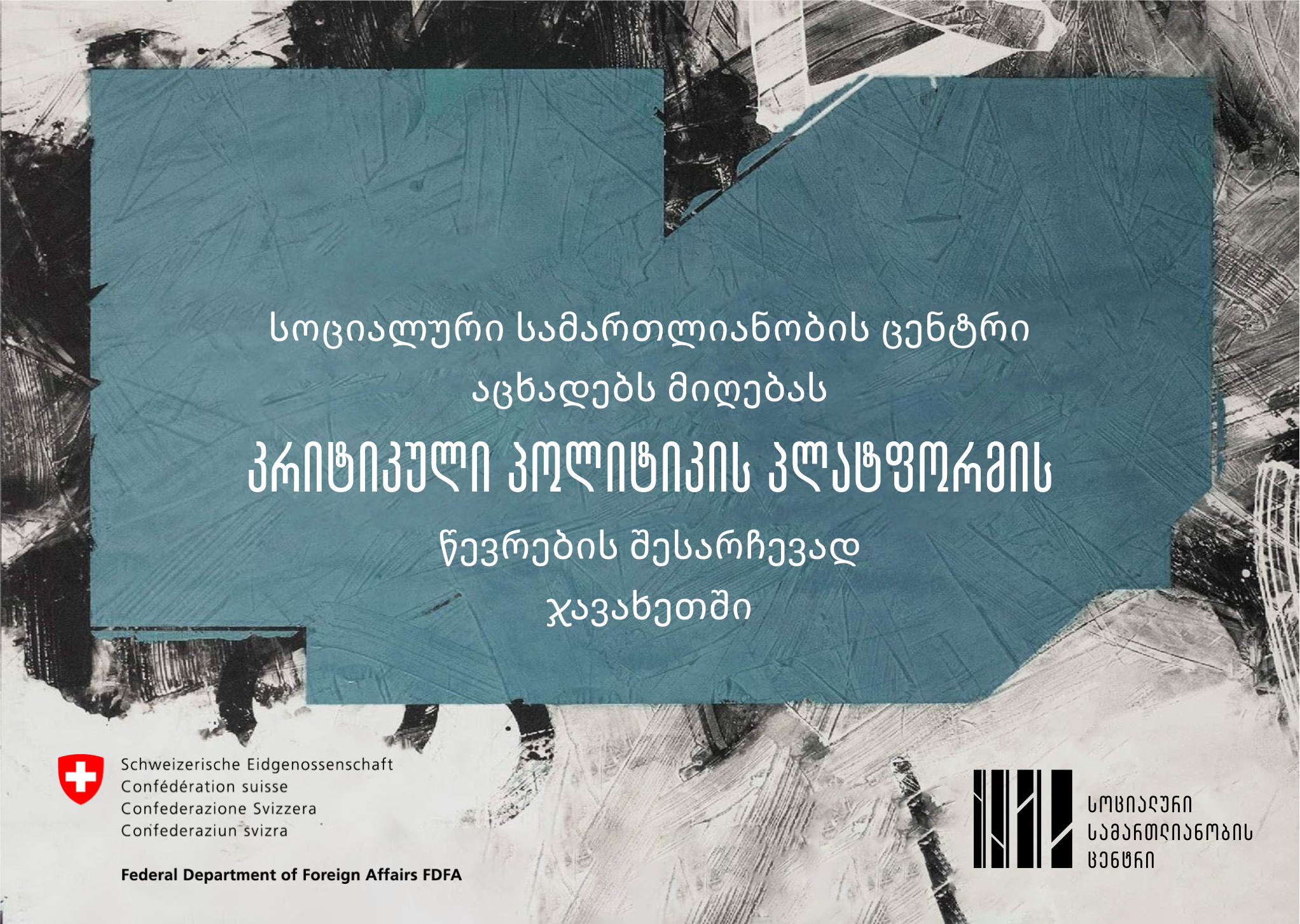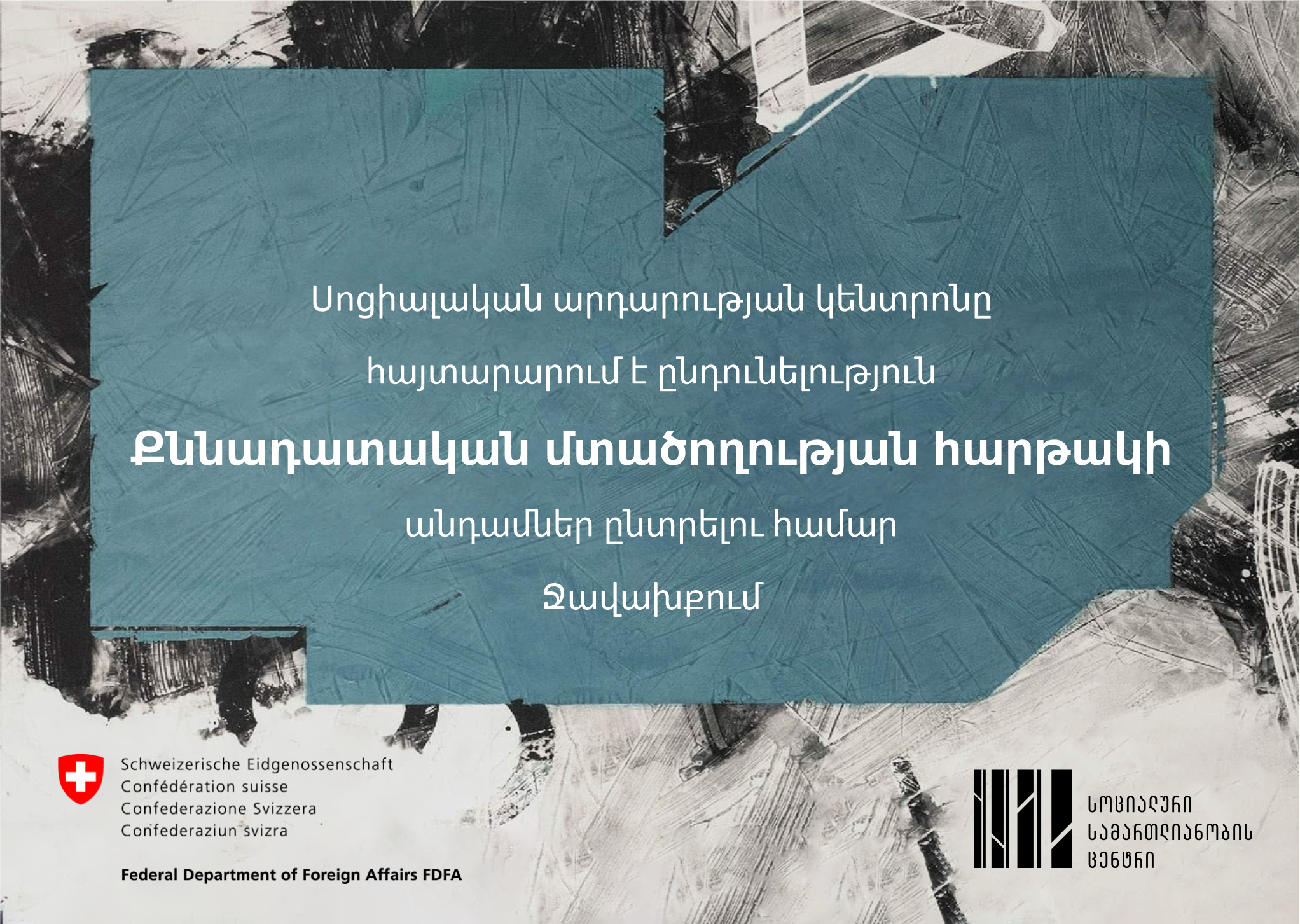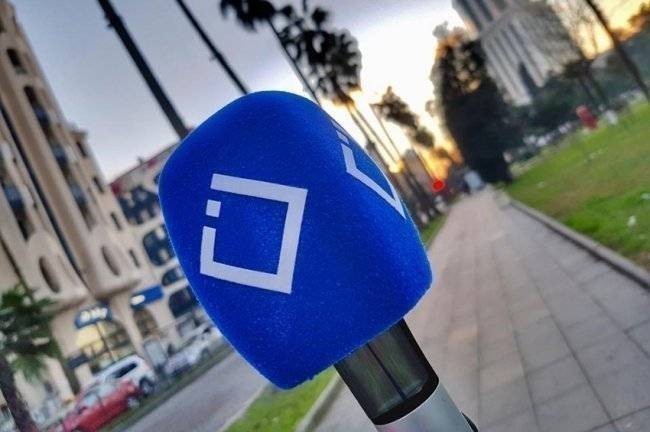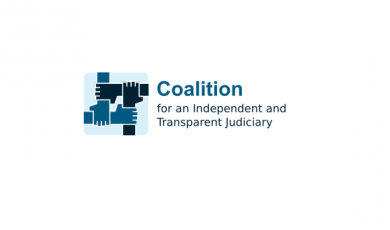

Տե՛ս հայերեն թարգմանությունը ստորև
სოციალური სამართლიანობის ცენტრი აცხადებს მიღებას ჯავახეთის რეგიონში კრიტიკული პოლიტიკის სკოლის მონაწილეების შესარჩევად.
კრიტიკული პოლიტიკის სკოლა, ჩვენი ხედვით, ნახევრად აკადემიური და პოლიტიკური სივრცეა, რომელიც მიზნად ისახავს სოციალური სამართლიანობის, თანასწორობის და დემოკრატიის საკითხებით დაინტერესებულ ახალგაზრდა აქტივისტებსა და თემის ლიდერებში კრიტიკული ცოდნის გაზიარებას და კოლექტიური მსჯელობისა და საერთო მოქმედების პლატფორმის შექმნას.
კრიტიკული პოლიტიკის სკოლა თეორიული ცოდნის გაზიარების გარდა, წარმოადგენს მისი მონაწილეების ურთიერთგაძლიერების, შეკავშირებისა და საერთო ბრძოლების გადაკვეთების ძიების ხელშემწყობ სივრცეს.
კრიტიკული პოლიტიკის სკოლის მონაწილეები შეიძლება გახდნენ ჯავახეთის რეგიონში (ახალქალაქის, ნინოწმინდისა და ახალციხის მუნიციპალიტეტებში) მოქმედი ან ამ რეგიონით დაინტერესებული სამოქალაქო აქტივისტები, თემის ლიდერები და ახალგაზრდები, რომლებიც უკვე მონაწილეობენ, ან აქვთ ინტერესი და მზადყოფნა მონაწილეობა მიიღონ დემოკრატიული, თანასწორი და სოლიდარობის იდეებზე დაფუძნებული საზოგადოების მშენებლობაში.
პლატფორმის ფარგლებში წინასწარ მომზადებული სილაბუსის საფუძველზე ჩატარდება 16 თეორიული ლექცია/დისკუსია სოციალური, პოლიტიკური და ჰუმანიტარული მეცნიერებებიდან, რომელსაც სათანადო აკადემიური გამოცდილების მქონე პირები და აქტივისტები წაიკითხავენ. პლატფორმის მონაწილეების საჭიროებების გათვალისწინებით, ასევე დაიგეგმება სემინარების ციკლი კოლექტიური მობილიზაციის, სოციალური ცვლილებებისთვის ბრძოლის სტრატეგიებსა და ინსტრუმენტებზე (4 სემინარი).
აღსანიშნავია, რომ სოციალური სამართლიანობის ცენტრს უკვე ჰქონდა ამგვარი კრიტიკული პოლიტიკის სკოლების ორგანიზების კარგი გამოცდილება თბილისში, მარნეულში, აჭარასა და პანკისში.
კრიტიკული პოლიტიკის სკოლის ფარგლებში დაგეგმილი შეხვედრების ფორმატი:
- თეორიული ლექცია/დისკუსია
- გასვლითი ვიზიტები რეგიონებში
- შერჩეული წიგნის/სტატიის კითხვის წრე
- პრაქტიკული სემინარები
სკოლის ფარგლებში დაგეგმილ შეხვედრებთან დაკავშირებული ორგანიზაციული დეტალები:
- სკოლის მონაწილეთა მაქსიმალური რაოდენობა: 25
- ლექციებისა და სემინარების რაოდენობა: 20
- სალექციო დროის ხანგრძლივობა: 8 საათი (თვეში 2 შეხვედრა)
- ლექციათა ციკლის ხანგრძლივობა: 6 თვე (ივლისი-დეკემბერი)
- ლექციების ჩატარების ძირითადი ადგილი: ნინოწმინდა, თბილისი
- კრიტიკული სკოლის მონაწილეები უნდა დაესწრონ სალექციო საათების სულ მცირე 80%-ს.
სოციალური სამართლიანობის ცენტრი სრულად დაფარავს მონაწილეების ტრანსპორტირების ხარჯებს.
შეხვედრებზე უზრუნველყოფილი იქნება სომხურ ენაზე თარგმანიც.
შეხვედრების შინაარსი, გრაფიკი, ხანგრძლივობა და ასევე სხვა ორგანიზაციული დეტალები შეთანხმებული იქნება სკოლის მონაწილეებთან, ადგილობრივი კონტექსტისა და მათი ინტერესების გათვალისწინებით.
მონაწილეთა შერჩევის წესი
პლატფორმაში მონაწილეობის შესაძლებლობა ექნებათ უმაღლესი განათლების მქონე (ან დამამთავრებელი კრუსის) 20 წლიდან 35 წლამდე ასაკის ახალგაზრდებს.
კრიტიკული პოლიტიკის სკოლაში მონაწილეობის სურვილის შემთხვევაში გთხოვთ, მიმდინარე წლის 30 ივნისამდე გამოგვიგზავნოთ თქვენი ავტობიოგრაფია და საკონტაქტო ინფორმაცია.
დოკუმენტაცია გამოგვიგზავნეთ შემდეგ მისამართზე: [email protected]
გთხოვთ, სათაურის ველში მიუთითოთ: "კრიტიკული პოლიტიკის სკოლა ჯავახეთში"
ჯავახეთში კრიტიკული პოლიტიკის სკოლის განხორციელება შესაძლებელი გახდა პროექტის „საქართველოში თანასწორობის, სოლიდარობის და სოციალური მშვიდობის მხარდაჭერის“ ფარგლებში, რომელსაც საქართველოში შვეიცარიის საელჩოს მხარდაჭერით სოციალური სამართლიანობის ცენტრი ახორციელებს.
Սոցիալական արդարության կենտրոնը հայտարարում է Ջավախքի տարածաշրջանում բնակվող երիտասարդների ընդունելիություն «Քննադատական մտածողության դպրոցում»
Քննադատական մտածողության դպրոցը մեր տեսլականով կիսակադեմիական և քաղաքական տարածք է, որի նպատակն է կիսել քննադատական գիտելիքները երիտասարդ ակտիվիստների և համայնքի լիդեռների հետ, ովքեր հետաքրքրված են սոցիալական արդարությամբ, հավասարությամբ և ժողովրդավարությամբ, և ստեղծել կոլեկտիվ դատողությունների և ընդհանուր գործողությունների հարթակ:
Քննադատական մտածողության դպրոցը, բացի տեսական գիտելիքների տարածումից, ներկայացնում է որպես տարածք փոխադարձ հնարավորությունների ընդլայնման, մասնակիցների միջև ընդհանուր պայքարի միջոցով խնդիրների հաղթահարման և համախմբման համար։
Քննադատական մտածողության դպրոցի մասնակից կարող են դառնալ Ջավախքի տարածաշրջանի (Նինոծմինդա, Ախալքալաքի, Ախալցիխեի) երտասարդները, ովքեր հետաքրքրված են քաղաքական աքտիվիզմով, գործող ակտիվիստներ, համայնքի լիդեռները և շրջանում բնակվող երտասարդները, ովքեր ունեն շահագրգռվածություն և պատրաստակամություն՝ կառուցելու ժողովրդավարական, հավասարազոր և համերաշխության վրա հիմնված հասարակություն։
Հիմնվելով հարթակի ներսում նախապես պատրաստված ուսումնական ծրագրի վրա՝ 16 տեսական դասախոսություններ/քննարկումներ կկազմակերպվեն սոցիալական, քաղաքական և հումանիտար գիտություններից՝ համապատասխան ակադեմիական փորձ ունեցող անհատների և ակտիվիստների կողմից: Հաշվի առնելով հարթակի մասնակիցների կարիքները՝ նախատեսվում է նաև սեմինարների շարք կոլեկտիվ մոբիլիզացիայի, սոցիալական փոփոխությունների դեմ պայքարի ռազմավարությունների և գործիքների վերաբերյալ (4 սեմինար):
Հարկ է նշել, որ Սոցիալական արդարության կենտրոնն արդեն ունի նմանատիպ քննադատական քաղաքականության դպրոցներ կազմակերպելու լավ փորձ Թբիլիսիում, Մառնեուլիում, Աջարիայում և Պանկիսիում։
Քննադատական քաղաքականության դպրոցի շրջանակներում նախատեսված հանդիպումների ձևաչափը
- Տեսական դասախոսություն/քննարկում
- Այցելություններ/հանդիպումներ տարբեր մարզերում
- Ընթերցանության գիրք / հոդված ընթերցման շրջանակ
- Գործնական սեմինարներ
Դպրոցի կողմից ծրագրված հանդիպումների կազմակերպչական մանրամասներ
- Դպրոցի մասնակիցների առավելագույն թիվը՝ 25
- Դասախոսությունների և սեմինարների քանակը՝ 20
- Դասախոսության տևողությունը՝ 8 ժամ (ամսական 2 հանդիպում)
- Դասախոսությունների տևողությունը՝ 6 ամիս (հուլիս-դեկտեմբեր)
- Դասախոսությունների հիմնական վայրը՝ Նինոծմինդա, Թբիլիսի
- Քննադատական դպրոցի մասնակիցները պետք է մասնակցեն դասախոսության ժամերի առնվազն 80%-ին:
Սոցիալական արդարության կենտրոնն ամբողջությամբ կհոգա մասնակիցների տրանսպորտային ծախսերը։
Հանդիպումների ժամանակ կապահովվի հայերեն լզվի թարգմանությունը։
Հանդիպումների բովանդակությունը, ժամանակացույցը, տևողությունը և կազմակերպչական այլ մանրամասներ կհամաձայնեցվեն դպրոցի մասնակիցների հետ՝ հաշվի առնելով տեղական համատեքստը և նրանց հետաքրքրությունները:
Մասնակիցների ընտրության ձևաչափը
Դպրոցում մասնակցելու հնարավորություն կնձեռվի բարձրագույն կրթություն ունեցող կամ ավարտական կուրսի 20-ից-35 տարեկան ուսանողներին/երտասարդներին։
Եթե ցանկանում եք մասնակցել քննադատական քաղաքականության դպրոցին, խնդրում ենք ուղարկել մեզ ձեր ինքնակենսագրությունը և կոնտակտային տվյալները մինչև հունիսի 30-ը։
Փաստաթղթերն ուղարկել հետևյալ հասցեով; [email protected]
Խնդրում ենք վերնագրի դաշտում նշել «Քննադատական մտածողության դպրոց Ջավախքում»:
Ջավախքում Քննադատական մտածողության դպրոցի իրականացումը հնարավոր է դարձել «Աջակցություն Վրաստանում հավասարության, համերաշխության և սոցիալական խաղաղության» ծրագրի շրջանակներում, որն իրականացվում է Սոցիալական արդարության կենտրոնի կողմից Վրաստանում Շվեյցարիայի դեսպանատան աջակցությամբ ։




